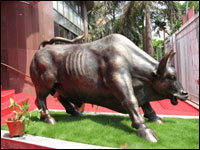 | « Back to article | Print this article |
Last year proved to be the lowest performance year for the capital market and the broking firms. The calendar year has seen the lowest capital mobilization from public offers since 2003, mainly on account of poor conditions in the secondary market. During 2011-12 (Till last trading day of December 2011) there were 40 Issues, which mobilized Rs 11646.6 crore, a 75% decrease from the year 2010-11 which had raised funds of Rs 48235 crore through 62 equity issues.
 At the end of December 2011, 14 out of 15 BSE indices closed negative compared to the end of previous month. At NSE, 8 out of 9 indices closed negative due to the high volatility experienced in market. Turnover from cash and derivative segment were also seen decreasing.
At the end of December 2011, 14 out of 15 BSE indices closed negative compared to the end of previous month. At NSE, 8 out of 9 indices closed negative due to the high volatility experienced in market. Turnover from cash and derivative segment were also seen decreasing.
The economy overall was bleak last year with sticky inflation forcing the RBI to raise the interest rates aggressively, lingering policy paralysis as the government battled multiple political issues, large fiscal slippages leading to crowding out of private sector and uncertain global macroeconomic backdrop, particularly the European debt crisis.
Considering the current economic challenges, Indian economy needs infusion of foreign capital in the form of FDI and FII inflows.
Industry Expectations
Corporate tax rate of 30% plus surcharge of 5% plus cess of 3%, results in effective tax rate of 32.45% for domestic companies and tax rate of 40% plus surcharge of 2% plus cess of 3%, results in effective tax rate of 42.024 for foreign companies which is significantly higher than in other developing / developed countries.
To abolish surcharge and Cess on corporate tax and particularly the corporate tax is expected to reduce to 25%. Tax rate applicable to foreign companies may also be relooked to provide level playing field and to facilitate better tax compliance and bring down cost of doing business in India.
MAT to be brought down to 15 % from 18.5% as the high rate adversely affects the MAT paying companies particularly the infrastructure companies.
Investment companies, which do not necessarily have subsidiaries and invest in various companies in the open market, should also be eligible for such deduction on further distribution of dividend on which DDT has been paid.
Securities Transaction Tax (STT) paid on transaction of sale /purchase of shares may be allowed as deduction by including it in the cost of acquisition and selling expenses under the Capital Gains. It will help in strengthen the capital market.
To promote saving among the public and also to mobilize funds for the industry at the cheaper rate a new section may be introduced to provide for the deduction upto Rs. 20,000 of interest income on bank deposits.
Need to pass the Forward Contracts (Regulation) Amendment (FCRA) Bill 2010 to provide autonomy to the Forward Markets Commission (FMC) with a view to recognise or derecognise bourses and collect funds from exchanges registered with it. Besides, once it comes into force, the FCRA bill will further enable overcoming current shortcomings in the commodity market.
Analyst/ Market Expectations:
The major change expected from this budget will be the removal of the Securities Transaction Tax (STT) and stamp duty on equity trades, as it will prove to be beneficial to the market. It would revive the intra-day trading by reducing the transaction cost. The measure is likely to boost the confidence of retail investors and stimulate healthy speculative activity, which is the need of the hour. But abolishing STT is unlikely to happen rather the budget can give a reduction in STT rates from the current 0.025% to 0.125% based on the type of products - cash (delivery or non-delivery based) and F&O.
Companies to watch:
Edelweiss Capital, Geojit BNP, India Infoline and Motilal Oswal Financials, Religare Enterprises.
Outlook:
The FII flow into the market during 2012 increased and FII's bought shares worth a net Rs 25075.21 crore in February 2012, as per provisional data from the stock exchanges. The strong FII inflow into the domestic market was due to the turnaround in the RBI's monetary policy and the consequent impact of the improved liquidity position.
If the STT is abolished it would reduce transaction cost, promote equity culture and encourage retail participation, which in turn further boost volumes. Removal of STT will be a major attraction for further FII inflows, and can boost the markets, even if otherwise the Union Budget 2012-13 is populist.